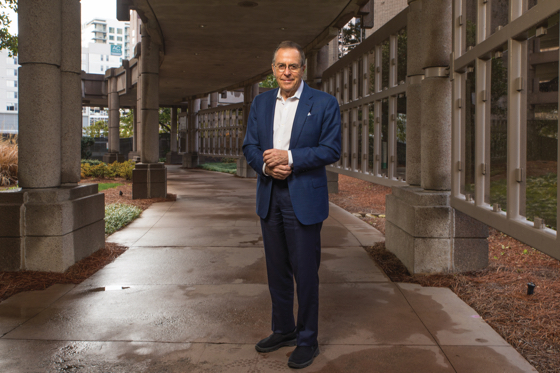Listening to Horst Schulze evangelize about the beauty of the hotel business is like going to hospitality church. His words come from deep down in his heart and at 82, he is as passionate as ever about achieving excellence the way he did for so many years, which most notably included co-founding the Ritz-Carlton Hotel Co. To Horst, HOTELS 2021 Legend, there is no compromise.
“Deep down, we are hosts to people who want to feel well,” he said with a level of conviction that makes you believe he is ready to don a suit and greet everyone who walks into any hotel. “We’re creating well-being. My God, how much more beautiful can it get?”

Even today, this modern-day Cesar Ritz — who started as a server’s assistant in a German resort town near his home, went on to work for Hilton and Hyatt before co-founding the Ritz-Carlton Hotel Co. in 1983, years later growing the Capella Hotel Group — still has some new ideas about what will attract guests in a post-pandemic world. But he is not quite ready to share them yet after recently working with a property owner in San Francisco, California, to create a new concept.
The German-born and trained hotelier driven by his passion for excellence that led to two Malcom Baldrige awards while growing Ritz-Carlton might also surprise you when he mentions philosophers like Aristotle and Plato as muses.
“I love to read about the people who impacted society by thinking totally different than what society was thinking at the time,” Schulze said for the April HOTELS cover story from his Atlanta, Georgia, office, still busy sitting on company boards, speaking to groups via Zoom and learning how to use a computer for the first time. “It really turns me on to read the philosophers and think, ‘Oh. Yeah. That’s who I am a little bit.’ I have always been hugely encouraged and it excited me to know that I can do things a little differently as long as it’s good for all concerned. That was always the mission.”
He was always led by, “Is it good for all concerned?” Once the answer was unequivocally yes, such as making Ritz-Carlton the world’s best hotel company, he said he no longer cared about opposition. “It didn’t matter anymore. I knew this was for everybody,” he said. “I had to find that to feel free and, frankly, to get over my insecurities.”
The back story
Schulze is also filled with passion when recalling great stories about his path to legendary status, which started with his first post as a 14-year-old working for a maître d’ at Kurhaus in Bad Neuenahr, Germany. He told young Horst, “Tomorrow morning, show up at 7 o’clock. Be punctual, but don’t come to work. Come to be excellent.” That went over his head at the time, but Schulze says it stayed with him. “He was a man of excellence,” Schulze noted.
Two years later, while in school, Schulze was asked to write an essay about his experience. That same night while working at the resort, something happened that changed his life dramatically. “I felt the maître d’ walk in. When he walked in, you could feel it,” Schulze said. “And when he approached a table that night I realized that those guests were proud that he came to them. When I sat down that night to write my essay, I realized he defined himself as a gentleman. That’s why people respected him. For the first time in my life, at 16, I realized I define myself. I can define myself even though I am only a busboy. I can define myself. It was so overwhelming. It stayed with me.”
Fast forward to 1965 and a room service waiter position in San Francisco after having worked at the Plaza Athénée in Paris, France, the Savoy in London, England, and some of the finest hotels in Europe. Schulze was hoping to get promoted to room service supervisor, and the manager was German. He assumed he had it made — but someone else was promoted. “I really suffered and it took me about three months to realize this guy deserved it more,” Schulze said, noting how he would sometimes come to work a little late after partying the night before.
When he realized his transgressions, he went back to his little furnished apartment in San Francisco’s Tenderloin District and “talked” to the old maître d’ who had passed away years earlier. “I said, ‘I’m sorry. I promised I would go to work for excellence, and I went to work for work. This will never ever happen again. I will go to work for excellence,’” Schulze said. He even wrote on his mirror, “Go to work for excellence,” reminding himself every day of his mission. “I didn’t go to work anymore,” he added.
By the way, the essay Schulze wrote back when he was 16 was titled, “We Are Ladies and Gentlemen Serving Ladies and Gentlemen,” which became the credo for Ritz-Carlton.
“That was what it was all my life — the fact that I defined myself was with me,” Schulze said.
Art of organization
The learning never stops for Schulze, who continues to be fascinated by conversations today when sitting in board meetings of companies not in the hotel business, but that can certainly benefit from his hospitality experience.
“I was excited to learn when I was invited to these boards, but after a while I said, ‘Wait a minute, I have a lot to offer as a hospitality professional because it’s all about the market.’ What do the customers want? Then align that desire of the customer to the employees. Then create an environment in which my employees want to do that.”
That, in a nutshell, is the difference between management and leadership, Schulze said. “The managers create processes and systems and measurements, but leadership creates an environment where they want to do it.”
Too many organizations talk about money rather than what actually makes money, Schulze added. “What makes money is the relationship with the customer,” he said.
While his board posts are teaching him about the sophistication surrounding strategic decision making, Schulze steadfastly adds that he would not completely substitute it for the art of the hotel business. “I would still go into a room and make sure that the towels are properly folded, that a buffet is beautiful set, that we will look people in the eyes and say a friendly hello, that uniform looks first class,” he said. “It cannot be taken away. That is the art of our business. We should never give that up.”
More than function
What he might do differently given the opportunity is remove hierarchical management. “It is so stupid,” he implored. “I went away from it toward empowerment and all those things. Everybody knows that. If I went back today, I would even much more concentrate on making the hotels beautiful places to come to work. I don’t mean physically beautiful, but a beautiful that you respect — that you’re truly part of a purpose. I would put more pride in the business. I would’ve spent more time teaching about the history of what we do — here’s the beauty of it. Here’s where it comes from. I’m very sad about that now as I didn’t implement it well enough in my career.”

Perhaps that is why in his home today he still has a picture of his mentor maître d’ showing 14-year-old Horst how to put the silver on the table, explaining why it is done like that. “I mean, you’re leading, and you don’t even know that’s the pride of our business? Come on! I mean, my fault.”
He would also make sure he tells the current generation of employees what’s in it for them. “My motives as an organization meet the motives for you to come to work,” Schulze explained. “It gives you fulfillment, it gives you future, it gives you respect, more income and more opportunity. That’s why we want to do the things we do. The fact that people need purpose will never change, and I cannot dismiss it. So, I cannot just give them function.”
Responding to challenges
While Horst has a few regrets, he also likes to talk about how troubling moments turned out to be the start of something great.
About 25 years ago, Schulze was diagnosed with cancer and was told he had a year to live. He fought back hard, refusing chemotherapy and instead choosing a unique diet to beat back the disease, which he did. And that experience marked the start of something beautiful, he says, as it allowed him to enjoy life and the people around him to a much greater extent.
“We should realize that as we go through life, all those markers are not the end,” Schulze said. “The same thing with the COVID — it’s not the end. It may be the beginning of something great.”
In fact, when COVID-19 started its path of destruction last March, Schulze called about 30 of his industry friends to tell them not to forget their vision. It shouldn’t change. Second, he said, don’t forget your values. And lastly, survival is the priority, at all costs.
The first thing he would have done in reaction, and it is not too late, is immediately get a hold of every repeat customer to tell them they are appreciated and tell them what the hotel is doing to get through the crisis. He would also call every travel agent to thank them for their past support and offer double commissions for a while when business starts to come back. “I would’ve been possessed to deal with the customers I had,” he said.
But of the 30 Horst called, he said maybe half took his advice. “It’s shocking to me. My goodness. They’re customers and you can have a better relationship once COVID ends.”
And end COVID-19 will, Horst said. “In two years, the industry is going to boom because there will be so much built-up demand,” he predicted. “It will boom. We will boom. Period. Except maybe I’m worried about the 3,000-room convention hotels. I’m really worried about them.”
For any other hoteliers who want to hang on Horst’s words, he said, “I love you all. We are part of a wonderful industry. It’s such a beautiful industry. Let’s put pride into it for every single employee. There’s a way to do that. Let’s remember that hospitality is an art that exists.”
He goes on to cite the first person that really wrote about hospitality — Saint Benedict, when he wrote to his abbess, “If a guest arrives, treat them as if it was Jesus himself.”
In other words, totally respect the people that come in. “What a beautiful thing to do, to respect a human. Your fellow human being who comes in your place of hospitality and is willing to pay for it. Why not be wonderful to them? That’s what I would tell them, and be proud of doing that.”

